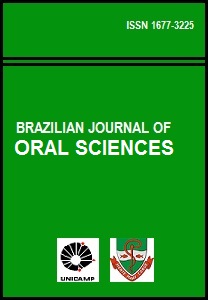Abstract
The antimicrobial activity of propolis extracts is well documented, but little is known about the antimicrobial properties of commercial products containing propolis, since these vary according to the geographical region in which the propolis is obtained. This study evaluated the antimicrobial activity of two samples of commercial propolis on 26 species of microorganisms obtained from ATCC and some wild strains: Gram-positive cocci and bacilli, and Gram-negative rods and yeasts. The tested products were two samples of Brazilian commercial propolis from Apis Flora™: 11.0% ethanolic extract of propolis (EEP) and Propomax™ 11.0% extract of propolis without alcohol (EP). Antimicrobial activity was determined by the agar diffusion technique, well method. MIC was determined for Staphylococcus sp. and Streptococcus mutans using the method of broth dilution with the propolis extract in serial concentrations. EEP and EP showed antimicrobial activity against all tested bacteria and yeasts, having a more pronounced action against Gram-positive bacteria and Candida albicans ATCC 10231, and a less evident activity against Gram-negative and Candida albicans FT2010. For S. mutans, the EEP MIC ranged from 8.8 to 4.4 mL of propolis, and the EP MIC, from 4.4 to <1.1 mL. For Staphylococcus sp., the MIC of both extracts was <1.1.References
Uzel A, Sorkun K, Onçag O, Cogulu D, Gençay O, Salih B. Chemical compositions and antimicrobial activities of four different Anatolian propolis samples. Microbiol Res. 2005; 160: 189-95.
Gebara ECE, Lima LA, Mayer MPA. Propolis antimicrobial activity against periodontopathic bacteria. Braz J Microbiol. 2002; 33: 365-9.
Koo H, Rosalen PL, Cury JA, Park YK, Ikegaki M, Sattler A. Effect of Apis mellifera propolis from two Brazilian regions on caries development in desalivated rats. Caries Res. 1999; 33: 393-400.
Miorin PL, Levy Junior NC, Custodio AR, Bretz WA, Marcucci MC. Antibacterial activity of honey and propolis from Apis mellifera and Tetragonisca augustula against Staphylococcus aureus. J Appl Microbiol. 2003; 95: 913-20.
Popova M, Silici S, Kaftanoglu O, Bankova V. Antibacterial activity of Turkish propolis and its qualitative and quantitative chemical composition. Phytomedicine. 2005; 12: 221-8.
Orsi RO, Sforcin JM, Funari SR, Bankova V. Effects of Brazilian and Bulgarian propolis on bactericidal activity of macrophages agains Salmonella typhimurium. Int Immunopharmacol. 2005; 5: 359-68.
NCCLS - National Committee for Clinical Laboratory Standars. Wayne, Pa, USA; 2003. Documents M7-A6 and 100-S13: NCCLS 20 (2).
Drago L, Mombelli B, De Vecchi E, Fassina MC, Tocalli L, Gismondo MR. In vitro antimicrobial activity of propolis dry extract. J Chemother. 2000; 12: 390-5.
Sawaya ACHF, Souza KS, Marcucci MC, da Silva Cunha IB, Shimizu MT. Analysis of the composition of Brazilian propolis extracts by chromatography and evaluation of their in vitro activity against gram-positive bacteria. Braz J Microbiol. 2004; 35: 104-9.
Sawaya AC, Palma AM, Caetano FM, Marcucci MC, da Silva Cunha IB, Araujo CE, et al. Comparative study of in vitro methods used to analyze the activity of propolis extracts with different compositions against species of Candida. Lett Appl Microbiol. 2002; 35: 203-7.
Marcucci MC, Ferreres F, García-Viguera C, Bankova VS, De Castro SL, Dantas AP, et al. Phenolic compounds from Brazilian propolis with pharmacological activities. J Ethnopharmacol. 2001; 74: 105-12.
Sforcin JM, Fernandes A, Lopes CA, Bankova V, Funari SR. Seasonal effect on Brazilian propolis antibacterial activity. J Ethnopharmacol. 2000; 73: 243-9.
Ota C, Unterkircher C, Fantinato V, Shimizu MT. Antifungal activity of propolis on different species of Candida. Mycoses. 2001; 44: 375-8.
Martins RS, Pereira ES, Lima SM, Senna MI, Mesquita RA, Santos VR. Effect of commercial ethanol propolis extract on the in vitro growth of Candida albicans collected from HIVseropositive and HIV-seronegative Brazilian patients with oral candidiasis. J Oral Sci. 2002; 44: 41-8.
Santos FA, Bastos EM, Maia AB, Uzeda M, Carvalho MA, Farias LM, et al. Brazilian propolis: physicochemical properties, plant origin and antibacterial activity on periodontopathogens. Phytother Res. 2003; 17: 285-9.
The Brazilian Journal of Oral Sciences uses the Creative Commons license (CC), thus preserving the integrity of the articles in an open access environment.

